Clutter and Mental Health: Simple Steps to a Clear Mind
Clutter impacts your mental health more than you might think. In fact, understanding the relationship between clutter and mental health is crucial. This article explains how and gives you practical tips to create a peaceful, organized space.
Key Takeaways
-
Clutter can significantly harm mental health, leading to increased stress, anxiety, and cognitive overload.
-
Different types of clutter—physical, digital, and emotional—affect our well-being, making it essential to identify and manage them.
-
Creating organized spaces and maintaining clutter-free environments can promote mental clarity, reduce anxiety, and enhance overall life satisfaction.
The Link Between Clutter and Mental Health
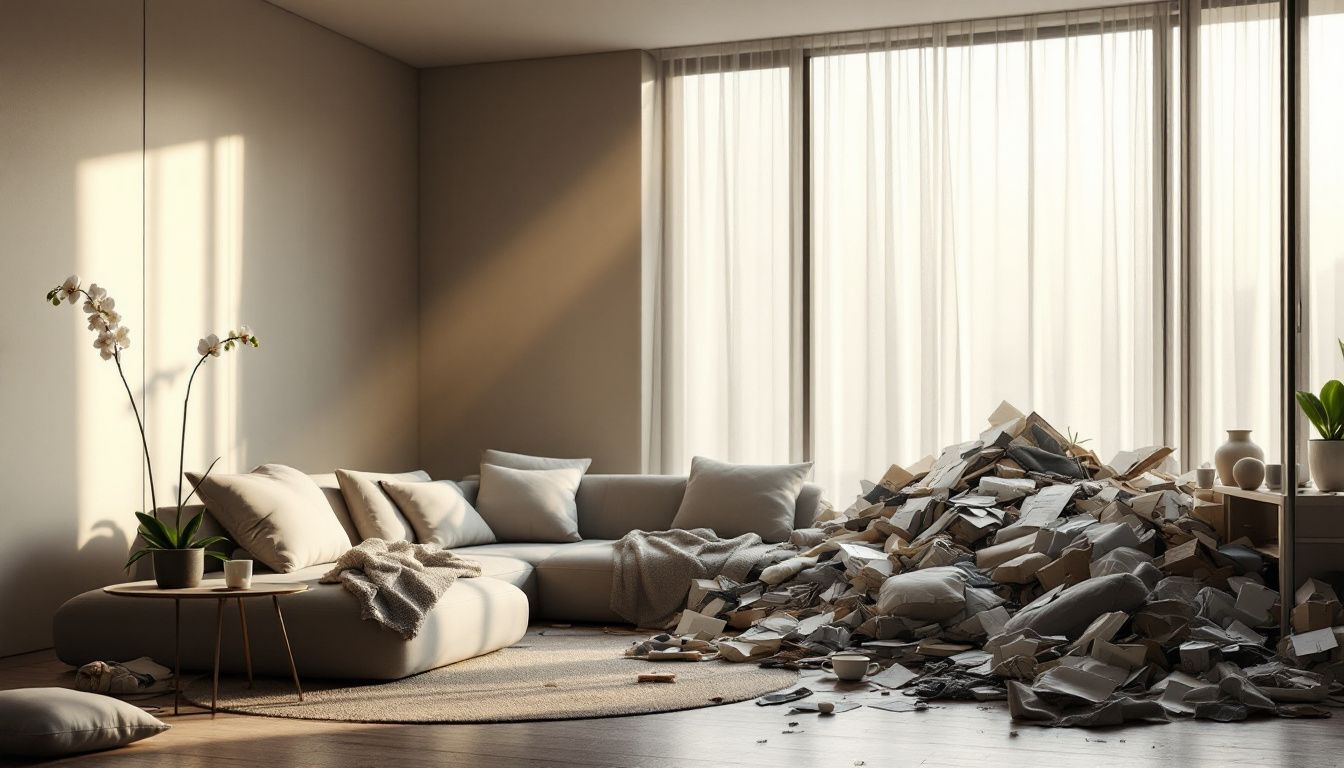
Many people may not recognize the deep connection between clutter and mental health. The significance is often underestimated. Living in a cluttered environment can significantly harm your mental well-being, causing stress and anxiety and lowering overall life satisfaction. Clutter can feel like a mental weight dragging you down each day.
Cluttered homes and spaces are constant reminders of unfinished tasks and chaos, which can lead to a perpetual state of stress and cognitive overload. This can make it challenging to focus on important tasks, further exacerbating feelings of anxiety and frustration. Research has shown that more clutter can lead to increased levels of the stress hormone cortisol, particularly in women.
Understanding the impact of clutter on mental health is the first step towards reclaiming your peace of mind. When we recognize that clutter leads to mental strain, we can start addressing the issue with practical solutions and a proactive mindset.
Cognitive Overload and Stress
Think of your brain as a computer with limited processing power. When your surroundings are cluttered, your brain’s ability to process information is severely impaired, leading to cognitive overload. This means that in a cluttered space, it becomes increasingly difficult to focus, solve problems, and complete tasks efficiently.
Living in a cluttered home can significantly raise cortisol levels, the stress hormone, especially in mothers who often juggle multiple responsibilities. This constant presence of background clutter drains your cognitive resources, leaving you feeling overwhelmed and mentally fatigued. The clutter isn’t just taking up physical space; it’s also occupying valuable mental real estate.
Moreover, cluttered environments can trigger the release of stress hormones, further exacerbating mental strain and leading to higher stress levels. Understanding clutter’s impact on your brain’s function and stress levels helps you take steps to create a more organized and calming environment.
Emotional Impact of Clutter
Clutter doesn’t just affect us cognitively; it has a profound emotional impact as well. Disorganized and cluttered environments can trigger a range of negative emotions such as guilt, shame, and anxiety. These feelings often stem from the perception that our space reflects our lives, and a cluttered space can make us feel inadequate and out of control.
The emotional turmoil caused by clutter can lead to a vicious cycle. When you feel overwhelmed by clutter, it can be challenging to find the motivation to declutter, leading to more clutter and more negative emotions. This cycle can significantly impact your overall mental health and well-being.
Consumerism and the accumulation of unnecessary items can also contribute to feelings of guilt and depression. Each item represents a decision, a memory, or an unresolved task, which can weigh heavily on your mind. Recognizing the emotional toll of clutter is crucial for addressing it effectively and improving your mental health.
Physical Space and Mental Health
A tidy physical space is more than just aesthetically pleasing; it promotes mental clarity and reduces feelings of being overwhelmed. When your environment is organized, it becomes easier to relax and find peace. Conversely, cluttered spaces make it hard to unwind and can leave you feeling constantly on edge.
Addressing clutter is essential for enhancing relaxation and overall mental health. By creating a tidy and organized space, you can improve your ability to focus, reduce stress, and increase your life satisfaction. Professional help can also be invaluable in managing both the physical and emotional aspects of clutter.
Understanding the link between your physical space and mental health is a powerful motivator to start decluttering. A clean and organized environment can act as a sanctuary, helping you recharge and face daily challenges with a clearer mind.
Identifying Clutter in Your Life
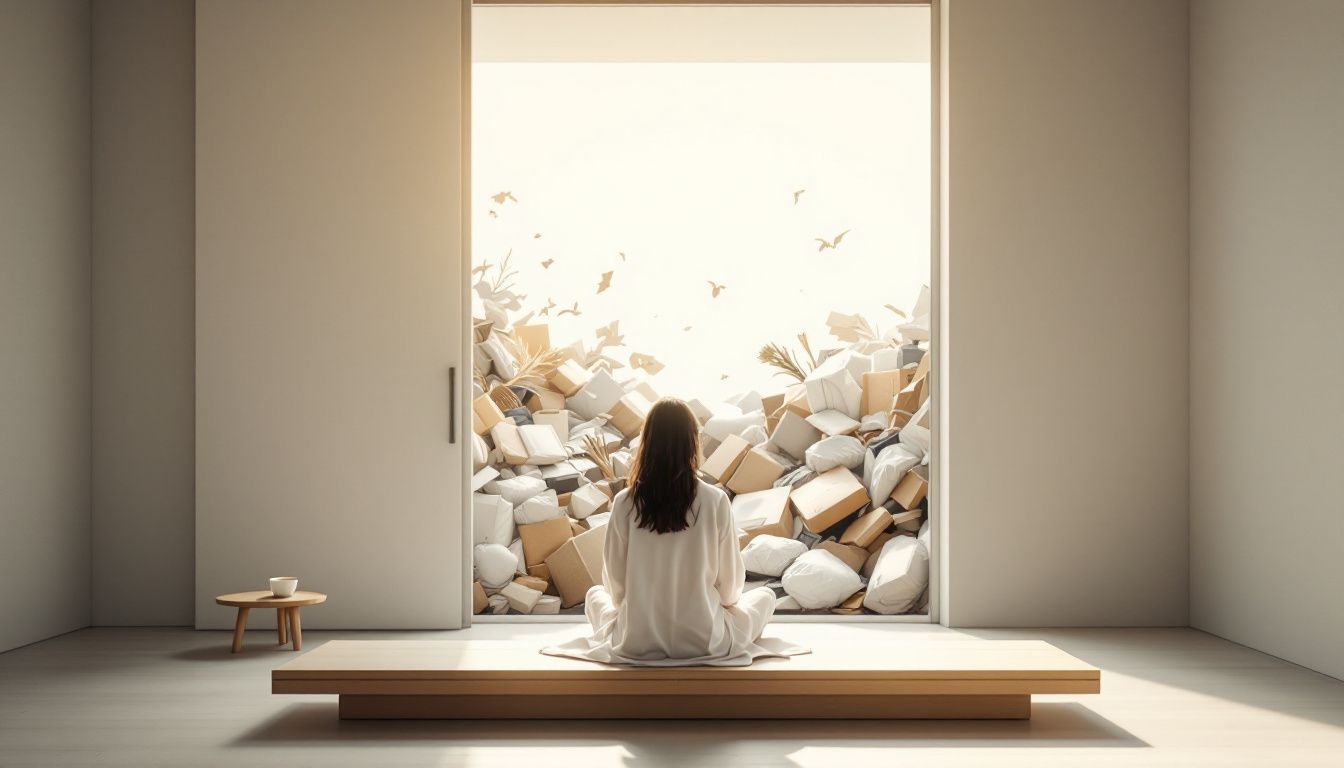
To tackle clutter effectively, it’s essential to recognize the different types of clutter that can invade your life. Clutter isn’t just about physical items; it can also be digital and emotional. Identifying these various forms is the first step in addressing their impact on your mental health.
Physical clutter includes the disorganization and accumulation of items in your living space, leading to a cluttered home and household chaos. Digital clutter involves unorganized files, numerous internet tabs, and excessive notifications that can distract and stress you out. Emotional clutter stems from unresolved feelings and attachments that complicate the decluttering process and impact your mental well-being.
By recognizing the different types of clutter, you can start to manage and reduce them, improving your overall mental health and creating a more harmonious environment.
Physical Clutter
Physical clutter is perhaps the most visible and commonly recognized form of clutter. Disorganization and the accumulation of items in your living space can significantly diminish your cognitive resources, making it harder to concentrate. Whether it’s a messy room or household chaos, physical clutter can lead to feelings of shame and inadequacy, preventing you from inviting people over and enjoying your home.
In many U.S. homes, children’s belongings often overflow into multiple areas, contributing to overall clutter and making it challenging to maintain a tidy home. Physical clutter isn’t just about having so much stuff; it’s about how that stuff is managed and organized within your space.
Addressing physical clutter involves not only decluttering but also creating systems to keep your space organized. This can help reduce feelings of being overwhelmed and improve your mental clarity and well-being.
Digital Clutter
In our increasingly digital world, digital clutter is a growing issue that can significantly impact your mental health. Digital clutter includes unorganized files, numerous internet tabs, and excessive notifications that can distract and elevate stress levels. Just like physical clutter, digital clutter can lead to cognitive overload, making it difficult to focus and be productive.
An overflowing inbox, countless digital files, and constant notifications can hinder your productivity and elevate your stress levels. The constant influx of digital information can make you feel overwhelmed and mentally drained.
Managing digital clutter involves organizing your files, reducing unnecessary notifications, and creating a more streamlined digital environment. This can help reduce stress and improve your ability to focus on important tasks.
Emotional Clutter
Emotional clutter is often less visible but equally impactful on your mental health. It stems from unresolved feelings and attachments that create mental blockages, making it hard to let go of possessions. These unresolved emotions can complicate the decluttering process and contribute to feelings of guilt, anxiety, and depression.
Many people view their belongings as extensions of their identity, which can make emotional decluttering particularly challenging. The process of letting go of all your stuff can evoke a wide range of emotions, from stress and anxiety to sadness and anger.
Addressing emotional clutter involves not only decluttering physical items but also working through the emotions attached to them. This can help you achieve a clearer mind and improve your overall mental health.
Psychological Effects of Clutter
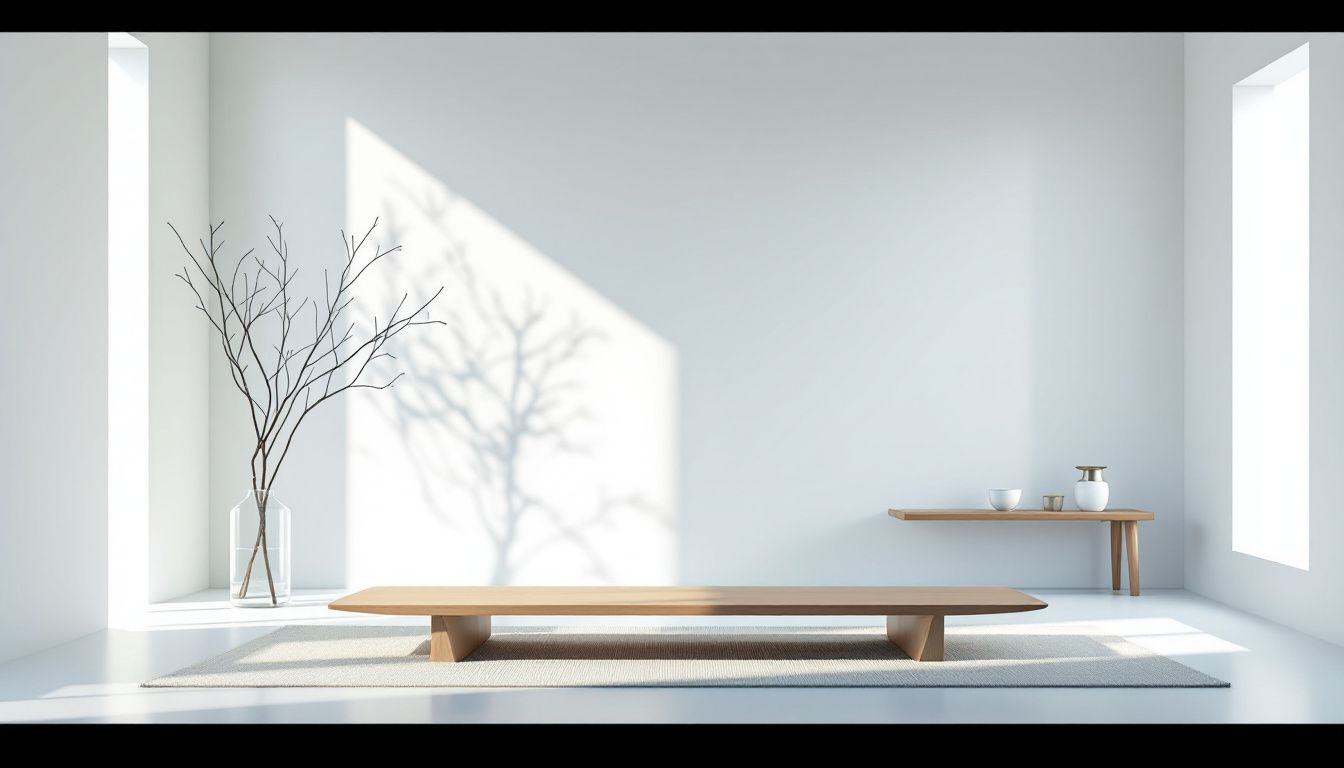
The psychological effects of clutter are far-reaching and can significantly impact your mental health. Clutter can elevate anxiety levels, impede your ability to focus, and even lead to social isolation. The interplay between clutter and mental health creates a feedback loop where each exacerbates the effects of the other.
Understanding these effects is crucial for addressing clutter and improving your mental well-being. By recognizing how clutter affects your mind, you can take steps to create a more organized and calming environment.
Increased Anxiety Levels
Clutter has a significant impact on anxiety levels, creating visual distractions and constant reminders of disorganization. Living in a cluttered environment can elevate cortisol levels, leading to chronic stress and anxiety. Research indicates that cluttered home environments can increase stress hormone levels, further contributing to feelings of anxiety and depression. The constant presence of clutter can weigh heavily on your mind, making it difficult to relax and find peace.
Addressing clutter can help reduce these stress hormones and improve your overall mental health. By creating a more organized environment, you can lower your anxiety levels and enhance your well-being.
Reduced Focus and Productivity
Clutter significantly affects your ability to focus and be productive. A cluttered environment can distract you and shift your brain into multitasking mode, reducing your efficiency and making it harder to complete tasks. This constant distraction and cognitive overload can lead to decreased focus and mental strain.
When your brain is constantly bombarded with visual distractions and unfinished tasks, it becomes challenging to concentrate. This can lead to lower quality work and a sense of frustration as you struggle to complete important tasks.
By managing and reducing clutter, you can create a more conducive environment for focus and productivity. This can help you achieve your goals more efficiently and improve your overall quality of life.
Social Isolation and Relationship Strain
Clutter can also have a significant impact on your social life and relationships. The embarrassment and inadequacy caused by a cluttered home can lead to social withdrawal and isolation. You might avoid inviting friends and family over, leading to feelings of loneliness and disconnectedness.
Disorganization can also strain relationships, as important items are often lost in the clutter, leading to frustration and conflict. The constant stress and chaos of a cluttered environment can make it difficult to maintain healthy relationships and social connections.
Addressing clutter can help improve your social life and relationships, reducing feelings of isolation and enhancing your overall well-being.
Practical Steps to Manage Clutter
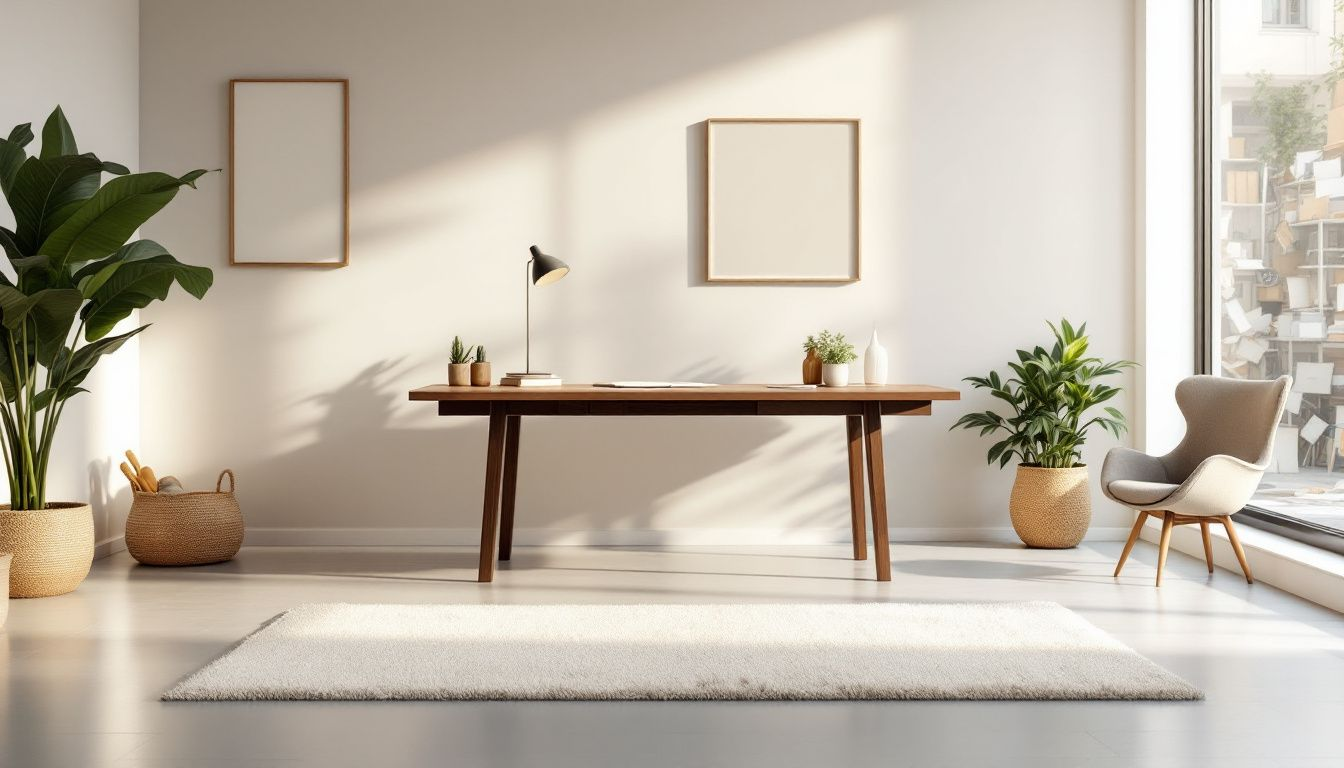
Managing clutter can seem like a daunting task, but with practical steps, it becomes more manageable. Starting small and breaking the process into manageable chunks can make a significant difference.
This section will provide you with practical advice on how to begin your decluttering journey.
Decluttering Strategies
Effective decluttering strategies can help you tackle clutter in a systematic and manageable way. One recommended approach is to start small, allocating just five minutes a day to decluttering. This can help you build momentum and make progress without feeling overwhelmed.
The Four-Box Method is another effective strategy, where you categorize items into four boxes: keep, donate, throw away, and relocate. This method helps you make decisions about each item and organize your space more effectively.
By using these strategies, you can start to manage clutter and create a more organized and calming environment.
Maintaining a Clutter-Free Space
Once you’ve decluttered your space, maintaining it is essential for long-term mental clarity and well-being. Daily habits and routines, such as a quick morning tidy-up, can prevent clutter from accumulating.
Integrating these habits into your everyday life can help you maintain a clutter-free space and reduce stress levels. Mindfulness about your belongings and consistent efforts to keep your space organized can improve your overall life satisfaction and mental well-being.
By maintaining a clutter-free environment, you can enjoy the benefits of a tidy space and a clearer mind.
Seeking Professional Help
Sometimes, managing clutter on your own can be overwhelming, and seeking professional help can provide valuable support. Professional organizers and therapists are trained to help individuals address clutter issues effectively, offering personalized strategies to cope with and reduce clutter.
Consulting a professional can help you process information and develop a plan tailored to your specific needs. They can provide you with the tools and techniques needed to maintain a clutter-free environment and improve your mental health.
If you’re struggling with mental health clutter, don’t hesitate to reach out for professional help. It can make a significant difference in your journey towards a clearer mind and a more organized life.
The Role of Environmental Psychology
Environmental psychology examines how our physical surroundings, like cluttered environments, impact our psychological well-being. By understanding the principles of environmental psychology, we can create spaces that support our mental health and enhance our overall life satisfaction.
This section will explore how environmental psychology connects our physical spaces with our mental and emotional states, providing insights into how clutter affects our well-being. It will also highlight the importance of creating supportive environments and the impact they have on our mental health.
Creating Supportive Environments
Creating a supportive home environment is essential for mental well-being and life satisfaction. Research shows that clutter can negatively impact mental health by increasing stress and reducing life satisfaction. A tidy physical space promotes mental clarity and reduces feelings of being overwhelmed.
Taking practical steps to manage clutter, such as dedicating time to sort through belongings and organizing items into categories, can significantly enhance the feeling of control and satisfaction in one’s life. Consistent habits and mindfulness about belongings are key to maintaining a clutter-free environment.
For persistent clutter issues, seeking help from professional organizers or therapists can provide additional support. Creating and maintaining a supportive environment fosters a sense of peace and enhances overall well-being.
Impact on Well-Being
Cluttered spaces are linked to lower well-being and productivity, while cleaner environments promote better health. Research indicates that cluttered environments negatively affect subjective well-being and overall quality of life. Clutter decreases productivity and increases irritability, leading to higher stress levels.
A cleaner home environment is linked to better physical health and increased activity levels. By creating a tidy and organized space, you can improve your ability to focus, reduce stress, and enhance your overall life satisfaction.
Understanding the impact of clutter on well-being helps us make more informed decisions about our living environments. By prioritizing a clutter-free space, we can improve our quality of life and mental health.
Hoarding Disorder: Understanding the Extreme
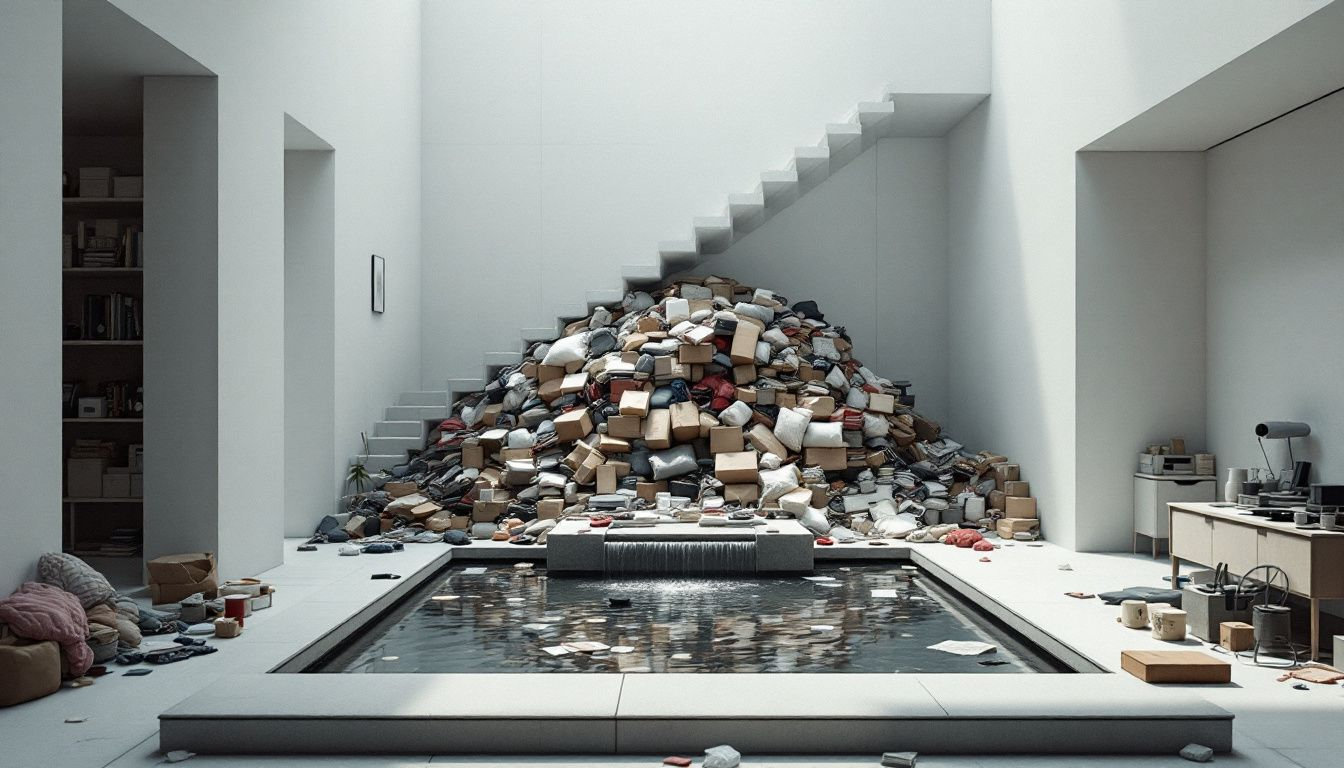
Hoarding disorder represents the extreme end of clutter issues and is characterized by an overwhelming urge to keep numerous items, leading to significant distress when trying to dispose of them. Understanding hoarding disorder helps us differentiate between ordinary clutter and a more serious mental health condition.
This section will provide an overview of hoarding disorder, its signs, and its causes and risk factors. It will help readers recognize when clutter may be indicative of a deeper issue and when to seek professional help.
Signs of Hoarding Disorder
Key indicators of hoarding disorder include an inability to throw away items, extreme distress when faced with disposal, and clutter that obstructs the use of living spaces. Hoarding behavior often begins in adolescence and tends to worsen over time, particularly by the mid-30s.
Recognizing the signs of hoarding disorder can lead to better understanding and necessary intervention for those affected. Persistent difficulty discarding or parting with possessions, leading to significant clutter in living spaces, is a hallmark of hoarding disorder.
Understanding these signs helps differentiate between common clutter issues and hoarding disorder, allowing for appropriate support and treatment.
Causes and Risk Factors
Hoarding disorder may be influenced by genetic factors, changes in brain function, and adverse life events that are difficult to cope with. A family history of the condition and personality traits associated with indecision and organizational difficulties increase the risk of developing hoarding disorder.
Potential causes include genetic predispositions, abnormal brain function, and stressful life events. Research indicates that hoarding disorder is distinct from obsessive-compulsive disorder, though it is part of its spectrum.
Understanding the causes and risk factors of hoarding disorder helps in developing effective interventions and support for those affected by this condition.
Summary
In summary, clutter has a profound impact on mental health, affecting everything from cognitive function to emotional well-being. Recognizing the different types of clutter—physical, digital, and emotional—helps us address their negative impacts on our lives. By understanding the psychological effects of clutter, we can take practical steps to manage and reduce it.
Creating a supportive home environment and maintaining a clutter-free space are essential for mental clarity and overall life satisfaction. For those struggling with severe clutter issues, seeking professional help can provide valuable support and strategies.
Remember, the journey to a clearer mind starts with small steps. By de cluttering your life, you can enhance your mental health, reduce stress, and improve your quality of life. Take control of your space, and you’ll be amazed at the positive changes it brings to your mind and well-being.
Frequently Asked Questions
How does clutter affect mental health?** **?
Clutter can really mess with your mental health by causing increased stress and anxiety, making it tough to concentrate. Clearing out the mess can help improve your overall sense of well-being.
What are the different types of clutter?** **?
Clutter comes in three main types: physical, digital, and emotional. Managing each type requires different strategies, so recognizing which one impacts you most can really help!
How can I start de cluttering my home?** **?
To start decluttering your home, set aside just five minutes a day and use the Four-Box Method to sort items into keep, donate, throw away, and relocate. This small, consistent effort can lead to a more organized and peaceful space.
What are the signs of hoarding disorder?** **?
If you're noticing a tough time letting go of things, feeling anxious about discarding items, or seeing clutter take over your living space, these could be signs of hoarding disorder. It's important to recognize these behaviors early, as they can escalate over time.
When should I seek professional help for clutter issues?** **?
If clutter is affecting your mental health and you're finding it hard to manage, it's a good idea to seek professional help. Professionals can provide tailored strategies to help you regain control and reduce clutter effectively.



